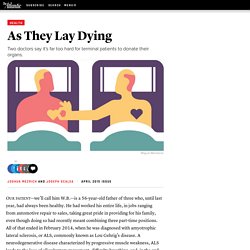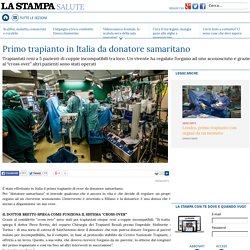

Why Selling Kidneys Should Be Legal. On Thursday, I will donate one of my kidneys to someone I’ve never met.

Most people think this sounds like an over-the-top personal sacrifice. But the procedure is safe and relatively painless. I will spend three days in the hospital and return to work within a month. I am 21, but even for someone decades older, the risk of death during surgery is about 1 in 3,000. My remaining kidney will grow to take up the slack of the one that has been removed, so I’ll be able do everything I can do now. If kidney donation is this easy, why do the stereotypes about heroic sacrifice persist? This is a serious problem, because there aren’t nearly enough saints in the country to tackle the growing waiting list for a kidney. This is a tragedy, but it doesn’t have to be this way. 6 Terrifying Things Nobody Tells You About Donating Sperm. To a young guy with not much money, sperm donation seems too good to be true.

It pays well (as we've pointed out before) and requires you to do nothing more than what you'd be doing anyway. And if you happen to help a childless couple along the way, that's just icing on the cake. Having actually been a sperm donor, I can say that you had better be prepared for a long haul. There are a lot of (horrifying) hoops to jump through, and then sperm banks expect you to masturbate like ... well, like it's your job. And it's not an easy one. #6. Sperm donation is a textbook example of a buyer's market; thousands of compulsively masturbating dudes are jockeying to impregnate a slim number of eggs. Getty"They scored well on taste and color, but we're concerned about their performance at the 100-meter dash. " You obviously must be male (or a very talented female), usually between 18 and 35, and live within an hour's drive of the sperm bank.
As They Lay Dying. Our patient—we’ll call him W.B.

—is a 56-year-old father of three who, until last year, had always been healthy. He had worked his entire life, in jobs ranging from automotive repair to sales, taking great pride in providing for his family, even though doing so had recently meant combining three part-time positions. All of that ended in February 2014, when he was diagnosed with amyotrophic lateral sclerosis, or ALS, commonly known as Lou Gehrig’s disease. A neurodegenerative disease characterized by progressive muscle weakness, ALS leads to the loss of all voluntary movement, difficulty breathing, and, in the end, death. W.B.’s life was turned upside down by the diagnosis. Initially, W.B. had assumed that he would arrange for his organs to be procured when he died, but then he read that kidneys from a living donor work better and last longer than kidneys from a deceased donor.
Kidney donation is a reasonable choice for effective altruists and more should consider it. This article was written by Thomas Kelly and Josh Morrison[1], who asked me to format and post it on the Forum.

It makes a detailed case which I'd encourage people to read - it's made me seriously consider donating, since I hadn't realised the health costs were so low. People in the UK interested in donating can do so here; people in the US can do so here. This piece makes the argument that kidney donation is a reasonable choice for many effective altruists. For some relevant background information, I donated my kidney through the National Kidney Registry in September 2014.
I’m also the cofounder of Waitlist Zero, a nonprofit that seeks to end the kidney shortage by promoting support for living kidney donors and increasing living donation rates. I encourage EAs who are considering kidney donation to talk with me or my co-founder Josh (also a kidney donor). Table of Contents 1. 2. Primo trapianto in Italia da donatore samaritano - La Stampa.
È stato effettuato in Italia il primo trapianto di rene da donatore samaritano.

Per “donatore samaritano” si intende qualcuno che è ancora in vita e che decide di regalare un proprio organo ad un ricevente sconosciuto. L’intervento è avvenuto a Milano e la donatrice è una donna che ha messo a disposizione un suo rene. Grazie al cosiddetto “cross over” sono stati poi trapiantati cinque reni a coppie incompatibili. “Si tratta - spiega il dottor Piero Bretto, del reparto Chirurgia dei Trapianti Renali presso l’ospedale Molinette di Torino - di una sorta di catena di Sant’Antonio dove il donatore che non poteva donare l’organo al parente malato per incompatibilità, ha il compito, in base al protocollo stabilito da Centro Nazionale Trapianti, di offrirlo a un terzo.
Questo, a sua volta, che doveva ricevere l’organo da un parente, lo ottiene dal congiunto del primo trapiantato e così via fino ad altri interventi in successione”. Trapianto di rene da vivente. Trapianti. Per la prima volta in Italia trapiantato rene grazie a donatore samaritano. Zell Kravinsky - How to give away $45 million.